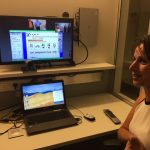Excellent blog from Koula Charitonos re Round Table Discussion: Technology-enabled language learning for refugees and migrants.
Excellent blog from Koula Charitonos re Round Table Discussion: Technology-enabled language learning for refugees and migrants.
openTEL is pleased to announce the introduction of the Completed Projects Short Seminar Series. The Short Seminar Series gives IET Academics the opportunity to present their research projects to the openTEL community from across the university. The short seminar series will be running periodically throughout the year.
Our first Short Seminar Series kicks off on the 9th May 2018 from 10am till 12.30 in the Ambient Lab, Ground Floor, Jennie Lee Building.
Kicking off is;
Dr Rebecca Ferguson presenting Innovating Pedagogy
Dr Wayne Holmes presenting Data-Informed Learning Design for Future Schools
Dr Jude Fransmann presenting Evidence and the Politics’ of Participation in Academic-INGO Research Partnerships for International Development
If you are interested in learning more about the above projects, key findings, the challenges involved, lessons learnt and the impact, you can reserve your seat using the doodle poll link below;
https://doodle.com/poll/r33vtfzqscbnv98n
We look forward to seeing you there!
 Across the globe, increasing numbers of migrants and refugees are making use of online and mobile resources to catch up with interrupted education and to support their language learning. Our research on the MASELTOV (www.maseltov.eu) and SALSA (www.open.ac.uk/blogs/salsa/) projects has demonstrated that mobile social learning is very well aligned with the needs of newcomers to a town or city, supporting their language learning and social inclusion. But not enough newcomers have the chance to experience this kind of learning, despite many of them having ready access to smartphones.
Across the globe, increasing numbers of migrants and refugees are making use of online and mobile resources to catch up with interrupted education and to support their language learning. Our research on the MASELTOV (www.maseltov.eu) and SALSA (www.open.ac.uk/blogs/salsa/) projects has demonstrated that mobile social learning is very well aligned with the needs of newcomers to a town or city, supporting their language learning and social inclusion. But not enough newcomers have the chance to experience this kind of learning, despite many of them having ready access to smartphones.

Christothea Herodotou, Mike Sharples and Eileen Scanlon, The Open University.
Citizen science or crowdsourcing has gained increasing popularity in recent years with web-based platform such as Zooniverse and iSpot scaffolding interactions between scientists and members of the public.
Little emphasis has been given to the educational benefits of citizen science, in particular for volunteers or members of the public who wish to contribute to citizen science activities.
Citizen inquiry: Synthesizing science and inquiry learning, recently published by Routledge, is the first edited collection of its kind to draw the emphasis on inquiry-based learning from participation in citizen science activities.
Citizen science is a growing trend in involving the public in different types of collaboration with scientists. In The Open University we are interested in how citizen scientists learn about science when engaged in inquiry activities, and the growth of such learning opportunities. We have developed a number of research projects and software around citizen science (iSpot, citizen inquiry, nQuire, nQuire-it, Sense-it, building sustainable policing-practitioner communities online). You can find out more here.